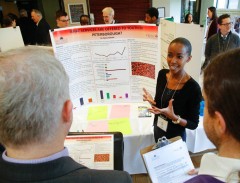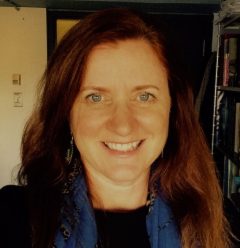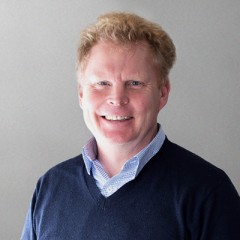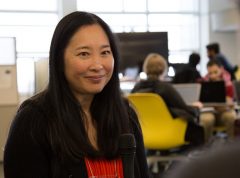Past Event! Note: this event has already taken place.
WEBINAR: Students in the Community: Models of Student Community Engagement
December 5, 2017 at 3:00 PM to 4:00 PM
| Cost: | Free |
| Audience: | Anyone |
| Key Contact: | Nicole Bedford |
| Contact Email: | cfice@carleton.ca |

A student explains her CCE project to listeners at TCRC’s Community Engagement Forum April 7, 2016. ©Peterborough Examiner
Students are increasingly looking for opportunities to gain real-world experience during their undergraduate and graduate degrees. While community partners are also looking to engage the talents of students, students don’t always have the needed skills for best supporting community partners during their placements.
So the question remains: How do post-secondary institutions build pathways of engagement that provide students with the training and support necessary to ensure both students and community benefit from research and service-learning placements?
On December 5, from 3pm – 4pm EST, join us for Students in the Community: Models of Student Community Engagement.
In this webinar, our presenters will share a few different models for integrating student training and engagement throughout their university careers. From the Bonner Student Development model in the United States, to University of Ottawa’s focus on Building Effective Practices in Work-Integrated Learning, these presentations will highlight how different models of engagement have worked at different institutions.
Presenters will share basic background on the development of each model, how the model works in practice, and the benefits and challenges to each model. Attendees will leave with a good understanding of different engagement options, as well as links to tools and resources for testing out models and practices at their own institutions.
Level: Beginner – Attendees do not need prior experience in community-campus engagement
Length: 1 hour
Attendance is limited, so be sure to reserve your spot today!
Presenters:
 Robert (Bobby) Hackett joined the Bonner Foundation in 1992 as Vice President and Director of the Bonner Scholars Program and assumed the role of President in July, 2010. Prior to joining the Bonner Foundation, Bobby worked at the Telesis Corporation, an affordable housing developer in Washington, D.C. He also served as managing director of the Campus Outreach Opportunity League (COOL) during its first three years of operation. In addition, for the past twenty years, Bobby has been associated in various capacities with the Youth Policy Institute, a Washington, D.C.-based non-partisan organization that researches and reports on policies and programs relating to young people. Bobby received his bachelors degree from Harvard University in 1985 and a masters in public and private management from Yale University’s School of Organization and Management in 1990.
Robert (Bobby) Hackett joined the Bonner Foundation in 1992 as Vice President and Director of the Bonner Scholars Program and assumed the role of President in July, 2010. Prior to joining the Bonner Foundation, Bobby worked at the Telesis Corporation, an affordable housing developer in Washington, D.C. He also served as managing director of the Campus Outreach Opportunity League (COOL) during its first three years of operation. In addition, for the past twenty years, Bobby has been associated in various capacities with the Youth Policy Institute, a Washington, D.C.-based non-partisan organization that researches and reports on policies and programs relating to young people. Bobby received his bachelors degree from Harvard University in 1985 and a masters in public and private management from Yale University’s School of Organization and Management in 1990.
 Dr. Eileen O’Connor is an Associate Professor in the School of Human Kinetics. She obtained her PhD in History, and was a postdoctoral fellow in Health Sciences, University of Ottawa (2004). Dr. O’Connor was interim-Director of the Research Centre for Sport in Canadian Society (RCSCS) at uOttawa 2014-2015, and is member of several research groups on the history of health, sport or gender studies. She was recently appointed to the Ontario Women’s Health Scholars Awards Selection Committee by the Council of Ontario Universities. Her research has been funded by CIHR, CRTI, FQRSC, Associated Medical Services, and Health Canada, and is published in journals such as the Canadian Bulletin of Medical History, JOLT: Journal of Online Learning and Teaching; Yale Journal for Humanities in Medicine; Journal of Emergency Management; and the American Journal of Disaster Medicine. Eileen is a member of various scholarly associations including the Canadian Society for the History of Medicine, International Society for the History of Physical Education and Sport, North American Association for Kinesiology in Higher Education, and the Canadian Association for Community Service Learning. She is an engaged scholar in the field of experiential learning and sits on the academic advisory committee of the Centre Michaëlle Jean for Global and Community Engagement at uOttawa, as well as the advisory board of the Work-Integrated Learning toolkit supported by the Higher Education Quality Council of Ontario (HEQCO). Dr. O’Connor was an invited participant to the UNESCO Mobile Learning conference in Paris, and to a recent FSS-led workshop to develop a Certificate in Community Mobilization for Syrian Refugees. Eileen is recipient of an Excellence in Teaching Award from the Faculty of Health Sciences in 2007; the uOttawa Community Service Learning, Outstanding Achievement, Professor of the Year Award in 2009; an OCRI National Capital Educator’s Award in 2010 and a uOttawa Excellence in Education Prize in 2016.
Dr. Eileen O’Connor is an Associate Professor in the School of Human Kinetics. She obtained her PhD in History, and was a postdoctoral fellow in Health Sciences, University of Ottawa (2004). Dr. O’Connor was interim-Director of the Research Centre for Sport in Canadian Society (RCSCS) at uOttawa 2014-2015, and is member of several research groups on the history of health, sport or gender studies. She was recently appointed to the Ontario Women’s Health Scholars Awards Selection Committee by the Council of Ontario Universities. Her research has been funded by CIHR, CRTI, FQRSC, Associated Medical Services, and Health Canada, and is published in journals such as the Canadian Bulletin of Medical History, JOLT: Journal of Online Learning and Teaching; Yale Journal for Humanities in Medicine; Journal of Emergency Management; and the American Journal of Disaster Medicine. Eileen is a member of various scholarly associations including the Canadian Society for the History of Medicine, International Society for the History of Physical Education and Sport, North American Association for Kinesiology in Higher Education, and the Canadian Association for Community Service Learning. She is an engaged scholar in the field of experiential learning and sits on the academic advisory committee of the Centre Michaëlle Jean for Global and Community Engagement at uOttawa, as well as the advisory board of the Work-Integrated Learning toolkit supported by the Higher Education Quality Council of Ontario (HEQCO). Dr. O’Connor was an invited participant to the UNESCO Mobile Learning conference in Paris, and to a recent FSS-led workshop to develop a Certificate in Community Mobilization for Syrian Refugees. Eileen is recipient of an Excellence in Teaching Award from the Faculty of Health Sciences in 2007; the uOttawa Community Service Learning, Outstanding Achievement, Professor of the Year Award in 2009; an OCRI National Capital Educator’s Award in 2010 and a uOttawa Excellence in Education Prize in 2016.
 Stephen Hill is an associate professor in the School of the Environment at Trent University. He’s interested in understanding policies and actions for preventing climate change, particularly how we produce and consume low-carbon energy. He is also involved in community-based research and work. Stephen spent nearly a decade studying and working in Alberta before finding his home at Trent University. He was the 2011 winner of the T.H.B. Symons Award for Excellence in Teaching and the 2011 winner of the CMHC Excellence in Education Award (Sustainable Practices). He’s a social scientist but approaches his research and teaching from an interdisciplinary perspective. His background spans a range of fields including a post-doctoral fellowship in the Haskayne School of Business (University of Calgary), a PhD in environmental science from the Faculty of Environmental Design (University of Calgary), and undergraduate degrees in chemical engineering (Queen’s) and biology (Queen’s). He is also a registered professional engineer in the province of Ontario.
Stephen Hill is an associate professor in the School of the Environment at Trent University. He’s interested in understanding policies and actions for preventing climate change, particularly how we produce and consume low-carbon energy. He is also involved in community-based research and work. Stephen spent nearly a decade studying and working in Alberta before finding his home at Trent University. He was the 2011 winner of the T.H.B. Symons Award for Excellence in Teaching and the 2011 winner of the CMHC Excellence in Education Award (Sustainable Practices). He’s a social scientist but approaches his research and teaching from an interdisciplinary perspective. His background spans a range of fields including a post-doctoral fellowship in the Haskayne School of Business (University of Calgary), a PhD in environmental science from the Faculty of Environmental Design (University of Calgary), and undergraduate degrees in chemical engineering (Queen’s) and biology (Queen’s). He is also a registered professional engineer in the province of Ontario.
 Nadine Changfoot, Associate Professor in Political Studies at Trent University and graduate faculty in Sustainability Studies, Canadian and Indigenous Studies, and Theory, Culture, and Politics. She engages in collaborative, participatory research with arts, environmental, disability, and healthcare communities. Her research includes: 1) methods and ethics of arts-based research creation for multimedia storytelling to tackle negative representations of disability and improve accessibility and inclusion; and 2) complex cross-sectoral partnerships that include the state, non-profit sector, and aggrieved communities for neighbourhood influence and environmental stewardship. She was Academic Co-lead of the CFICE Community Environmental Sustainability (Peterborough-Haliburton) hub in Phase I of the project, collaborating with Abbey Gardens, Haliburton Highlands Land Trust, and GreenUP, and continues to participate as part of the Evaluation and Analysis working group.
Nadine Changfoot, Associate Professor in Political Studies at Trent University and graduate faculty in Sustainability Studies, Canadian and Indigenous Studies, and Theory, Culture, and Politics. She engages in collaborative, participatory research with arts, environmental, disability, and healthcare communities. Her research includes: 1) methods and ethics of arts-based research creation for multimedia storytelling to tackle negative representations of disability and improve accessibility and inclusion; and 2) complex cross-sectoral partnerships that include the state, non-profit sector, and aggrieved communities for neighbourhood influence and environmental stewardship. She was Academic Co-lead of the CFICE Community Environmental Sustainability (Peterborough-Haliburton) hub in Phase I of the project, collaborating with Abbey Gardens, Haliburton Highlands Land Trust, and GreenUP, and continues to participate as part of the Evaluation and Analysis working group.